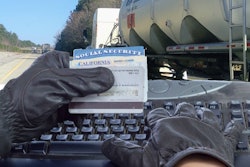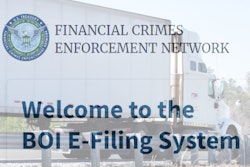It’s important to create a separate bank account that will be used to manage the income and expenses of your business. All income from your trucking business should be deposited there.
In addition, trucking expenses should be paid out of this account. In the event of an IRS audit, having personal finances mingled with your business could cost you thousands of dollars. It will also be impossible for you and your accountant to analyze your business accurately if your personal finances are mixed in with your business.
Every month you should write a “distribution check” or make a direct transfer online from your operating account to your personal account as a “paycheck” to cover your personal living expenses. The target amount can be determined from the monthly personal and family cash requirements shown in your budget.
Cash flow: Importance of the reserve account, and other ways to avoid financial trouble
Saving is not easy. It’s much harder, though, when you deny the inevitable. For example, you know your equipment will wear out. Smart owner-operators save for maintenance in proportion to miles run.
The best owner-operators have at least $5,000, and often multiples more, in reserve before they ever go into business. The purpose of the reserve account is to set aside money for large costs that could put a substantial drain on your operating cash, such as major maintenance items, tires, quarterly estimated taxes and insurance deductibles.

Minimize cash advances. When company drivers become owner-operators, many carry forward the company-employee habit of taking weekly cash advances for expenses. Undisciplined owner-operators have been known to use that cash on unnecessary accessories, entertainment and other unbudgeted expenses.
Frequent, unwise use of cash advances can make it difficult to get a true picture of where your money is going. Also, since this cash already is deducted from your settlement, it can be mentally defeating to keep getting small settlements. In addition, transaction fees can reduce the advance by as much as 10%. Work toward using your business operating account, not cash advances, to manage your cash flow.
Avoid overdrafts. Some banks use a tiered structure for overdraft fees; they go up as more checks bounce. That check that bounced a year ago could mean your next mistake will trigger the tiered rate.
- Monitor your account. Record every check as soon as it’s written. Don’t forget all those debit card purchases. Develop a way to log monthly drafts, such as for utilities, whether it’s an item in a spreadsheet or a note on a calendar.
- Use overdraft protection. Most banks offer this service, which automatically draws from your savings or credit card account to cover a bad check. If using savings, you obviously need to keep a good stash to make it work. Linking to a credit card is less favorable, but if it’s paid off quickly, it’s still less costly than bouncing a check.
- If you don’t have online account access, get it. Once you’re signed up at your bank or credit union for mobile banking, manage your finances anywhere you have web access or a cell signal.
Independents, consider a factoring company. The demand for cash when starting your own company presents many challenges. Late payments, long billing cycles and high fuel costs contribute to why half of small businesses fail in their first year.
If operating under your own authority is your intention, a factoring company might help enhance cash flow early on and provide the support that will help build up cash reserves. Factors offer independents quick access to the cash tied up in their invoices, minus a factoring fee that covers their collections activity, access to broker credit information and other perks. Some offer accounting services and discounted fuel networks with significant volume savings.
Most of the smallest carriers, including independent owner-operators, choose non-recourse factoring, where the factor pays the client the full invoiced amount up front, so that in most cases there is no loss to the client even if the shipper or broker fails to pay the invoice. The factor keeps a percentage of the invoice. In recourse factoring, that percentage is lower because the client is responsible for paying the money back if the factor fails to collect on an invoice. Pricing depends on the fleet’s volume, creditworthiness and other factors.
As with any contract, keep a close eye on the the fine print. Some otherwise non-recourse agreements could become recourse after a certain amount of time. There could be fees for moving to another factoring company or ending the relationship. The factoring company could attempt to require you to factor all your business, not simply the difficult accounts.
The proliferation of smartphones has played a big role in the growth of factoring and newer versions of quick-pay services. Phones serve as customer portals for access to invoice creation/scanning and transmission, broker credit checks or credit lines. Mobile-based services have reduced the hassles associated with mailing paperwork, greatly speeding up the process.
Non-recourse arrangements most often require a credit OK from the factoring company to factor one of a broker’s invoices. Most companies give a yes or no to any individual broker. In the past, a trucker might need to call in to the factor for the credit check, but most today offer self-serve portals online.
[Related: Real-time cash flow clarifies operations for small fleet]
Avoid predatory lenders. Of particular concern in recent years has been the rising use of merchant cash advances. An MCA provides cash to a business that needs money immediately and lacks the credit to obtain a traditional loan with better terms. MCA rates are high and often expressed in terms that are difficult to compare to annual percentage rates. Late-payment penalties are stiff and can quickly inflate the effective APRs well into triple digits.
The advance is set up to be repaid with a guaranteed share of receivables, often over six to 12 months and debited directly from the business’s account. Sometimes it works out. Too often it doesn’t, as when a single default triggers a spiral of increasing debt that becomes unmanageable, threatening the life of the business and sometimes stripping the owner of business and personal assets.
[Related: Struggling small fleets stung by aggressive cash advance lenders]
Credit cards. It is useful to have a business credit card. However, owner-operators often spend too much because using the card is seemingly painless. Yet if a credit card balance is not paid off at the end of each month, the interest charges, sometimes exceeding 18%, can mount rapidly.
You’ll get the best rate on credit cards, as well as other forms of lending, by keeping a high credit rating. Federal law now requires each of the three major credit reporting companies to send you a free copy of your credit report, on request, once a year. Visit www.annualcreditreport.com.
If you’re going to use credit cards, reap the benefits of use by selecting one with a rewards program. Bankrate.com offers comparisons of current rewards and other terms for leading cards. Study offers carefully, because high annual fees and interest rates can wipe out the value of rewards.
Fuel discounts. Various fuel cards are available to independents as alternatives for those looking to combine maximum fuel discounts with the accounting aspects of a debit card tied to a traditional bank account. For single-truck owner-operators and other small fleets, some fuel networks can be opted into for discounts off the cash price. Some offer fund management through mobile apps.
Some fuel networks and cards are available through private companies, and some are offered through trucking trade groups, such as the Owner-Operator Independent Drivers Association and the National Association of Small Trucking Companies. Some programs offer discounts comparable to large-fleet volume discounts.
As noted, some third-party service providers like factoring companies offer fuel discount cards.
Read next: Debt resources: Last-resort backstop to cash-flow crises










